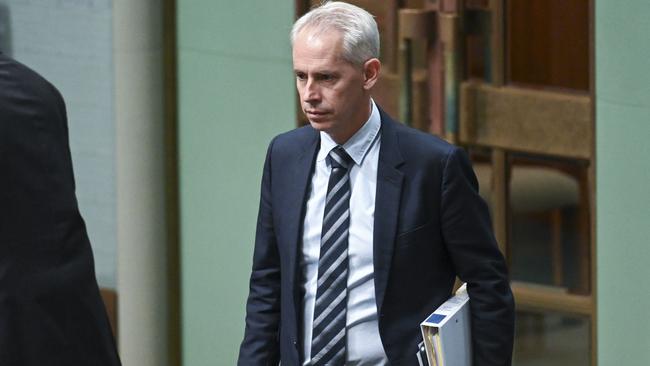Direction 99 farce frees two more offenders before it’s replaced
Direction 99 was being formally replaced at midnight on Thursday but at least two more serious offenders used the federal order to escape deportation in the meantime.

A Tongan man who was twice convicted over involvement in separate fatal road accidents and a New Zealand sex offender have both been spared deportation in the final days of Immigration Minister Andrew Giles’ Direction 99 order.
The new Direction 110 order unveiled by Mr Giles after The Australian discovered how Direction 99 had led to dozens of serious offenders being allowed to remain in Australia comes into effect on Friday, with several cases having been assessed under the old system in the interim.
Direction 99 required decision-makers to make the strength, nature and duration of an individual’s ties to Australia a primary consideration when determining whether foreign criminals should have visas cancelled.
It led to a surge in the proportion of visa cases being overturned by the Administrative Appeals Tribunal, with multiple sex offenders, drug traffickers and repeat domestic violence perpetrators winning reprieves.
Among those to have succeeded in having visas reinstated in the days leading up to the end of Direction 99 was Sitiveni Mautofu, a Tongan citizen twice imprisoned over deadly accidents two decades apart. Mautofu, who moved to Australia from Tonga in 1988 when he was 21, was convicted of dangerous driving occasioning death in 2002 after he ran a red light and hit another vehicle. An occupant of the other car died.
More than 20 years later, Mautofu was sentenced to 12 months imprisonment for negligent driving causing death after a magistrate found he had not taken due care when he collided with a motorcycle, killing the rider. The rider did not have a licence and had high levels of THC in his system at the time, but the magistrate found there was no evidence he was speeding when he collided with Mautofu.
The AAT found Mautofu’s ties to Australia weighed in favour of revoking the cancellation of his visa, noting he had a large extended family in Australia and a wife and adult child here. Mautofu also lodged a petition signed by 353 Australian citizens and permanent residents calling for the cancellation decision to be revoked.
“Given the length of time he has spent in the community, his positive contribution during that time and close ties to his immediate and extended family, this primary consideration (of ties to Australia) is afforded considerable weight in favour,” the AAT ruled.
Also spared in recent days was a New Zealand man identified only as XVNQ, who had been convicted over an incident in Sydney’s inner west when he was under the influence of drugs.
According to the AAT decision, he entered the lift of an apartment building and found a heavily intoxicated woman on the floor under the influence of liquid ecstasy. She had her legs in the air and the man used his mobile phone to film a video of her exposed genitalia. He then took the woman outside where he repeatedly touched her vagina, and then placed the woman in his car.
He was ultimately sentenced to three years in jail over the incident.
A recent report by a forensic psychologist found the man was a moderate to high risk of general reoffending due to his “very high” drug dependency.
Direction 99’s “strength of ties” consideration was found to weigh in the man’s favour, noting he and his former partner had three Australian children together and he remained involved in their lives.
The interests of those children were found by the AAT to carry “great importance” in its decision.
A spokeswoman for the Immigration Minister said the new direction would ensure a “commonsense approach” to assessing visa cancellation cases.
“The government has been clear in stating our expectation that the protection of the Australian community should be given greater weight in visa decisions,” she said.
It is understood the cases of Mautofu and XVNQ are now also being reviewed by the minister’s office.







To join the conversation, please log in. Don't have an account? Register
Join the conversation, you are commenting as Logout